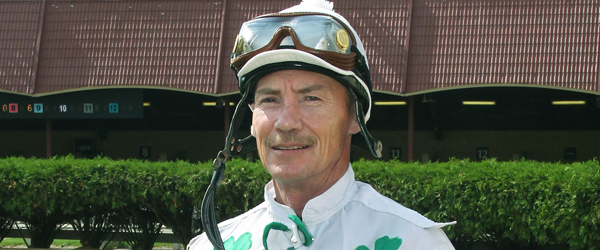 Bobby Walker, Jr., made his way up the tunnel after a race last week, moving slowly and clearly in pain but intent on riding the next race nonetheless. It wasn’t going to happen. He simply wasn’t able, not after taking the head of an 1,100-pound thoroughbred directly to the groin.
Bobby Walker, Jr., made his way up the tunnel after a race last week, moving slowly and clearly in pain but intent on riding the next race nonetheless. It wasn’t going to happen. He simply wasn’t able, not after taking the head of an 1,100-pound thoroughbred directly to the groin.
The question here doesn’t concern his inability to ride, but his intentions. You don’t survive as a race rider for more than 30 years if you aren’t tough. Walker, as he attempted to demonstrate once again, is tough as they come.
He has had his share of shoulder, neck and back injuries, like any other rider. One mishap stands out.
In 1992 a horse he was riding was tripped up in the first 40 yards of a race and went down, unseating him. A trailing animal stepped on his nose, nearly tearing it off his face. “It was laying against my eye,” Walker recalled.
It was bad enough that his two-year-old daughter, Brittany, wasn’t allowed to see him in his wounded condition. “I looked like the Elephant Man,” Walker said.
Surgeons had to rebuild a nose for him and the first attempt wasn’t satisfactory. A second surgery a few months later was needed to refuse blood vessels, a procedure more painful than the first. Today, there is a modest scar at the top of the bridge and a small obtrusion where the break healed.
“It isn’t a question of if you going to get hurt in this game, it’s just when,” Walker allowed. Riding thoroughbreds for a living presents risks.
Then again, there isn’t much in his life Walker, a native of Monroe, La., hasn’t tried to ride. Sheep, small steers, horses – all mounts he had in the Junior Britches rodeo; then something considerably more dangerous at the next level in Jack Pot rodeos.
His career course was mapped out when an uncle gave him a tip that a hand was needed at a nearby barn to break babies. Months later he was mounting his first horse at Louisiana Downs. It was 1979. He was 18 years old.
He rode his first stakes winner with the bug, won 137 races and the riding title at Evangeline Downs in 1980 and topped it off with 31 wins in the last four weeks in Shreveport.
He has won just about every stake race in Louisiana save the Louisiana and Super derbies. He has been on the backs of Eclipse Award winners Risen Star and Dispersal. Yet, the fastest horse he has ever ridden is quite familiar to the 1980s crowd in Shakopee: Who Dr. Who. “He wasn’t the best, but he was definitely the fastest,” Walker said.
In addition to Louisiana, Walker has ridden regularly in Texas, Oklahoma and Nebraska. Need a rider for a stake race somewhere in the Midwest. Walker was often that fellow. He rode extensively for Jack Van Berg at one time
He needs 51 more winners to reach 3,000 for his career, a goal that keeps him motivated, even at 51. “Ten percent of my wins have come in stake races,” he added. One of those 10 percent was in the 2005 Lady Canterbury Stakes aboard Rue de Reves, two more were aboard Claiming Crown winners in Shakopee and the most recent was Santo Gato in the Honor the Hero Stakes on Memorial Day.
He rode at Canterbury full-time for the first time in 2001, winning 37 races, good for fourth place in the standings.
He rides regularly for the Gary Scherer barn, a trainer he’s known since the mid 1980s, before he was a trainer.
“Bobby rode my first official winner for me as a trainer,” Scherer said. “It was at Hoosier Park, a horse named Lake Harriet, owned by the Valenes.”
Scherer, like anyone else who watches him ride, knows Walker can still compete. “He knows how to save a horse, which stick to use and when. He gives a horse pretty much the best trip it’s going to get.”
Sometimes a horse might not get the best trip and end up a winner nonetheless. Like Cowboy Luke in Saturday’s seventh race, putting Walker one win closer to that goal.
This blog was written by Canterbury Staff Writer Jim Wells. Wells was a longtime sportswriter at the Pioneer Press and is a member of the Canterbury Park Hall of Fame.